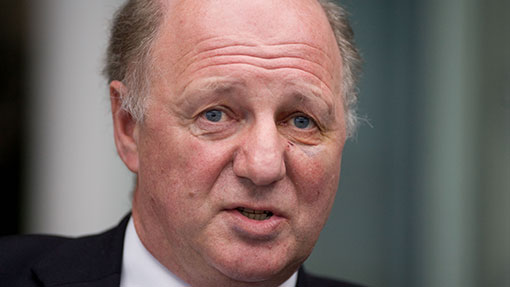Royal Welsh Show 2014: Days of farm subsidy are numbered, says Paice

An end to direct payments for farmers in the UK could happen within the next 20 years, former farm minister and First Milk chairman Jim Paice told the Royal Welsh Show.
Speaking at the RICS Wales rural professional group reception on Monday (21 July), Sir Jim said he was not calling for an end to farm support. But he predicted that the days of the basic payment, as it is now called, were numbered.
“It’s going to be down and I think it will disappear altogether in the next couple of decades,” he told the audience.
Within this farming context, Sir Jim criticised the latest CAP deal, describing it as a “wasted opportunity” to break out of the “straitjacket-supported agriculture” the EU has had for the past 50-60 years – and place greater emphasis on food security.
See also: David Cameron Q&A – We will stick to badger cull
He pointed out that by 2050, there would be an estimated 2.5bn more people on the planet, of which 1bn would be in continental Africa.
And with the triple challenges of climate change, economic and political turmoil, the chances of these African nations feeding themselves were slim.
CAP deal “wasted opportunity”
“I don’t think Europe as a whole, or the European Commission, faced up to the challenges ahead,” said Sir Jim.
“We could have spent far more effort on restructuring the industry to how you face up to those challenges, on how you can encourage the industry to invest to reduce their production costs, whatever side of agriculture we’re going to be in.
“We must not forget that agriculture is now a global industry. Food flies all over and is shipped all over the world day by day. We are all now impacted by what is happening all over the world, so it’s a hugely volatile industry.
“Steps could have been taken to address that volatility. I believe it was a greatly missed opportunity.”
Sir Jim said it was becoming clear that more emphasis must be placed on looking after farmland.
“A recent Cambridge of University report suggested we are going to be seven million hectares short of land – and as many farmers will tell you, they don’t make it any more,” he added.
“This means we need to think much more carefully about how we combine some of the imperatives of food production and looking after the countryside and the wildlife; how we actually make them work together rather than in some sort of opposition.
“That is again why I think the CAP and the whole ‘greening’ issue has failed completely to meet that challenge.”
Sir Jim questioned the rationale behind EU rules, which will determine that larger arable farmers in his region, East Anglia, must grow at least three different crops in their rotation.
“Environmentally, it will achieve absolutely nothing – just a lot more bureaucracy and complications for our farmers,” he said.
On the other hand, he said farmers in other parts of the UK who were combining competitive, modern agriculture and food production with very comprehensive wildlife conservation “should be used as examples as a way of driving forward the whole issue of greening”.
Sir Jim said people who suggested that eating less meat would solve our food security problems were misguided.
“Two-thirds of the world’s crop land is grass and predominantly so in Wales. Yet nobody has yet invented a way of making grass into a human food other than via an animal,” he added.
“If we talk about abandoning meat production, it ignores completely the role of grass in that meat production, or indeed dairy production, and assumes that all the meat we eat is from grain, which of course it isn’t.”
Seize global dairy opportunities
He urged the UK to capitalise on its ability to produce grass better than nearly every country in the world to increase its milk production and tap into global dairy demand, which is rising by 2.3% a year.
“We must never forget that half our milk is turned into other products – primarily cheese, milk, butter, cream, flavoured milk and other things. Many of those are products we can seek to export. We need to break into other markets.”
Sir Jim was heavily involved in the agreement to thrash out the framework for the dairy industry’s voluntary code of practice at the Royal Welsh Show two years ago.
He said the future of the code was “up in the air” but hoped it would survive.
“I think it did do a great deal to foster a sense of trust between farmers and the milk processors – trust that had completely broken down,” he added.
